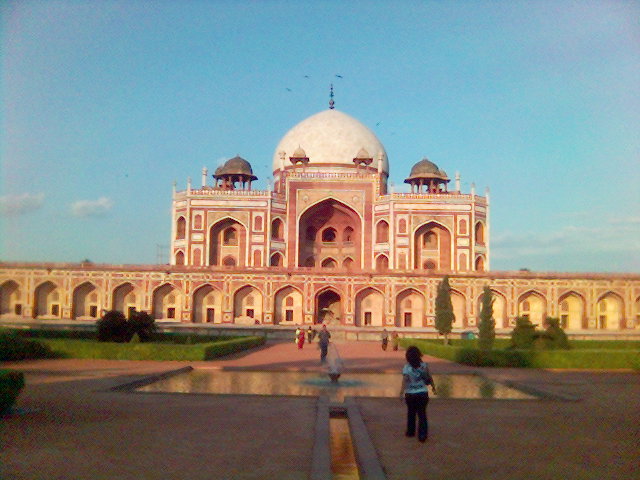 |
| Humayun's Tomb in Delhi |
Babur, the founder of the Mughal Empire in India in 1526, was succeeded by his eldest son Humayun who inherited “a monarchy which could be held together only by the continuance of war conditions which in times of peace was weak, structureless and invertebrate.”
When Babur died in 1530, Humayun was 23 years old. Since father's conquests had not been consolidated in the short span of four years, the army lacked cohesiveness and the administration an effective machinery.
The name Humayun (meaning "the Fortunate”) is rather a misnomer. Though the second Mughal emperor, he had to spend his life as a wanderer almost all through his life. He lost the nascent Mughal kingdom and when he regained it, he did not live long enough to rule it.
Humayun was born in Kabul in 1508. He ascended the throne on December 30, 1530 four days after death of Babur.
The imperial treasury was almost bankrupt and beyond the frontiers powerful political forces, such as Gujarat, Malwa and Bengal, were up in arms against the Mughals. On top of it Humayun divided the empire inherited from his father among his three brothers, Kamran, Hindal and Askari. The Afghans, who had not yet been crushed, also raised their heads. Of them, Sher Khan, known as Sher Shah Suri, proved be the most formidable enemy of Humayun, and after defeating the latter at Chausa and Kanauj in 1540, completely shattered his prospects.
After his final defeat at the hands of Sher Shah Suri, the Mughal empire in India was temporarily out of picture and Humayun had to pass nearly fifteen years (1540-55) in exile. During his wanderings in the deserts of Sind, Humayun married Hamida Banu Begam, daughter of Shaikh Ali Ambar Jaini, who had been a preceptor to Humayun’s brother Hindal. While he was at Amarkot (now in Pakistan), where his son Akbar was born on 23rd November, 1542.
After the untimely death of Sher Shah from an accidental explosion at Kalinjar, the time was ripe for Humayun to restore the Mughal Empire and he succeeded in doing so. But shortly after regaining the empire Humayun died in accident on the 24th January, 1556.
Humayun founded a city at Delhi named the Dinpanah (World refuge). However no remains are available of this first Mughal city. He took great interest in astrology and mathematics. Nizam-ud-Din Ahmad, author of Tabaqat-i-Akbari, writes about his generosity,"All the wealth of Hindustan would not have sufficed to maintain his generosity." Humayun was highly addicted to opium.
Humayun's tomb in Delhi is an important Mughal monument which attracts visitors in large numbers. It was commissioned by his wife Bega Begum or Haji Begum.
Comments
Post a Comment